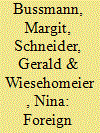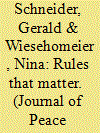| Srl | Item |
| 1 |
ID:
067216


|
|
|
| 2 |
ID:
080984


|
|
|
|
|
| Publication |
2008.
|
| Summary/Abstract |
One controversy in the study of civil war relates to the role that institutions play in ethnically diverse societies. `Constitutional engineers' advance various institutional arrangements, ranging from democracy in general to specific constitutional and electoral rules, as those mechanisms that help divided societies to resolve disputes peacefully. Political sociologists, by contrast, maintain that political institutions are largely an epiphenomenon. Synthesizing the two conflicting schools of thought, the authors examine how different institutions in conjunction with three forms of ethnic diversity - fractionalization, dominance and polarization - affect the risk of civil war. It is argued that groups perceive institutions as a constraint and that they consider the usage of political violence if they cannot achieve their goals peacefully. The examination of these conditional institutionalist hypotheses for the period between 1950 and 2000 shows, in accordance with recent theoretical work, that fractionalization can indeed be linked to low-intensity civil wars and that this effect is particularly strong in democracies in comparison to autocracies. Interacting the measures of diversity with different democratic institutions, the authors confirm that rules that encourage power-sharing lower the risk of war in diverse societies. The event-history models, moreover, show that the combination of fractionalization and majoritarian voting forebodes badly for the internal stability of a state. Within the set of democratic regimes studied in this article, presidential systems are the most war-prone institutional setting.
|
|
|
|
|
|
|
|
|
|
|
|
|
|
|
|